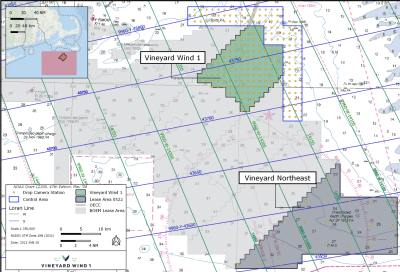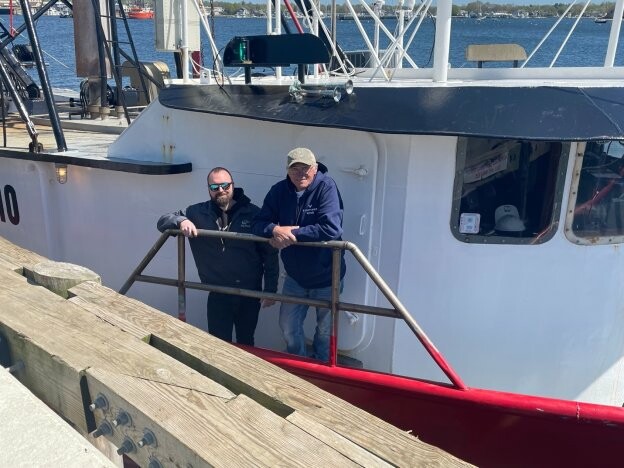Offshore wind power developers Vineyard Wind have spent about $5 million since 2019 to hire more than 30 southern New England fishing vessels to support various stages of the 800-megawatt turbine project, company officials said this week.
The boats and crews have served in fisheries research campaigns, as scout vessels to support geophysical survey vessels, and more recently as safety vessel support for offshore cable lay installation.
Vineyard Wind CEO Klaus S. Moeller and colleagues visited the State Pier in New Bedford Monday to see off Capt. Tony Alvernaz and the crew of the F/V Kathryn Marie as they embarked on an eight-day trip to support offshore construction project in federal waters off Martha’s Vineyard.
“Local fishermen bring tremendous value to our operations. Their unique local knowledge and network is a huge part of the successful construction of Vineyard Wind,” Moeller said in a company statement. “This emphasizes that the development of offshore wind would bring opportunities for our industries to work together, and we hope that the precedents we’ve set will become the norm for each and every project.”
Now on track to build the first utility-scale offshore wind project in U.S. waters, Vineyard Wind and the federal Bureau of Offshore Energy Management are a primary target of offshore wind critics who insist BOEM’s leasing off southern New England was rushed before adequate environmental reviews.
After that experience BOEM officials say they are trying to use lessons learned to reduce conflicts with wind development in other regions. Vineyard Wind and other developers with leases off New York and New Jersey have been working with commercial and recreational captains.
“Experienced and local fishermen like Captain Alvenaz and the F/V Kathryn Marie have an important role to play in the development of this historic project, and a tremendous opportunity for collaboration through the further buildout of this industry in the Northeast,” said Miguel Sanchez Calero, Vineyard Wind’s deputy CEO.
“Fishing can be a boom or bust industry,” said Alvernez. “By working with Vineyard Wind, we’re able to add a new stream of revenue to our business, while at the same time update our vessel with improved safety equipment. This should be a real opportunity for us for years to come."
Other fishing vessels are now engaged in related work offshore. The Horizon, an 85-foot scalloper from New Bedford, is working with the University of Massachusetts Dartmouth School for Marine Science and Technology (SMAST) on performing drop camera surveys starting on May 3 on Vineyard Wind’s lease areas 501 and 522.
In hiring local fishing vessels, wind developers have paid to upgrade their equipment and train crews to meet offshore wind industry health, safety and environment (ESG) standards and Coast Guard requirements. Vineyard Wind put in $250,000 for additional safety equipment on vessels including personal locator beacons for crew, additional VHF radios and other equipment.
The training includes safety classes at the University of Massachusetts Dartmouth SMAST campus, and sponsoring captain training classes to help fishermen get their Merchant Mariner Credentials. Ten fishermen have completed and passed their Coast Guard exams, more than 20 more now in the process, according to Vineyard Wind.
In a first annual report Vineyard Wind submitted to the state, compiled by UMass Dartmouth and Springline Research Group, a summary of local economic impacts says the company’s spending more than doubled early estimates for the number of jobs created and dollars invested.








